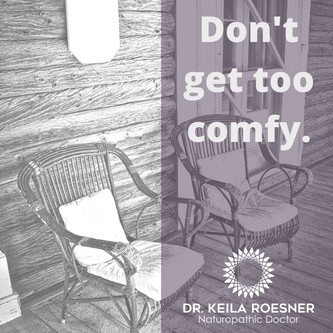 On average, how many hours a day do you spend sitting, uninterrupted? One hour? Two hours? Three…or more? Our ancient ancestors spent much of their time on the move, hunting and gathering to serve their basic needs, as well as more play and family time. Obviously, the balance between movement and fuel has shifted dramatically over time, most notably since the technological revolution. Unlike our ancestors, we no longer search for food. Instead, we are now on a quest for time, as hours fly by while we’re hunched over a keyboard. On an average day, many of us are likely sitting more than we are moving and consuming more calories than we are burning. Many of us regularly put in eight-hour workdays seated at a desk – sometimes even more. We get headaches and neck tension and need to see our massage therapist more often. We then go home and unwind on the couch, binge-watching our favourite shows. The hours begin to add up. Maybe we make a little time to fit in some exercise each day; however, with more conveniences at our fingertips, we can do a lot more while moving a lot less. The longer we sit, the more our bodies begin to feel tight, tired and sore. It’s clear that too much sitting isn’t good for us. But did you know that it can even lead to earlier mortality? Sitting and Premature Death That’s right…too much sitting can kill you! In fact, some are saying that “sitting is the new smoking” because its impact is so significant. According to recent research from the Journal of the American Heart Association, prolonged sitting presents similar health risks as smoking, such as heart disease, lung cancer, and diabetes. It also increases premature death by about 50 percent! Even more surprising, too much sitting increases your risk for an early death regardless of your fitness level or other lifestyle habits. You simply cannot undo hours of sitting with a 20 minute walk (although you should still keeping walking). But sitting isn’t just bad for your heart or metabolism; it is also bad for your brain! Researchers at the University of California have discovered a connection between sedentary behaviour and thinning regions in the brain that is critical to new memory formation. So, what if your job requires you to be at a desk, all day, every day? Are you supposed to quit? Well, of course, that’s not practical. However, there are a few simple things you can do to ensure that you keep your body regularly moving for a longer, healthier life. Tips to Sit Less & Live Longer
Do you spend excessive amounts of time sitting? Do you experience any health problems that you think could be related to a sedentary lifestyle? Let’s chat and get to the root of your health issues. Book an appointment with our clinic, and together we will find ways to improve your overall health and well-being so that you can live your life to its fullest. Call 519-275-2187 ext. 7 or Book Online to get started. In health, Dr. Keila Roesner BHSc ND
References:
0 Comments
Leave a Reply. |
Top 75 Naturopath Blogs & Websites For Naturopathic DoctorsAuthorDr. Keila Roesner is a Naturopathic Doctor. When not treating patients she is also an enthusiastic barefoot-strolling, music-loving, yoga-doing kitchen wiz - who also happens to be a wrestling fan. Categories
All
|
Let us take you from hormonal to whole.
|
Dr. Keila Roesner, BHSc ND
Naturopathic Doctor, Hormone Warrior and Your Wellness Cheerleader 247 Church Street, Stratford ON N5A 2R7 (519) 273-0900 [email protected] |
|



 RSS Feed
RSS Feed